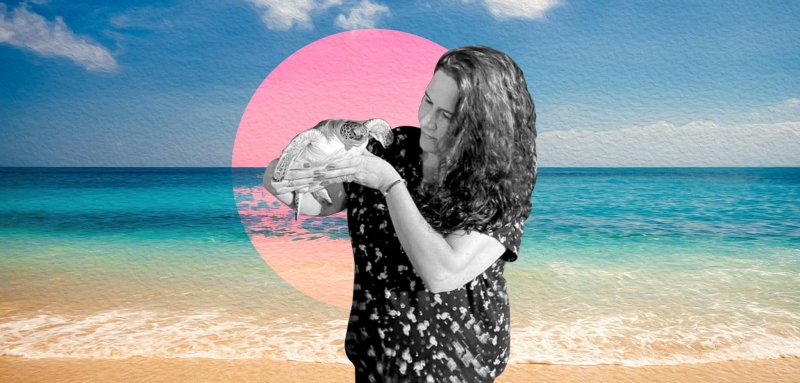When she sees a “friend” out on the street, she runs to it and touches it gently as if she is giving it the safety it’s missing. She feeds it, searches for any pain, and senses its troubles without the use of words. She then takes it t home to give it the comfort it deserves, treats it if it is injured, and restores its trust in people and life, before releasing it to its native habitat, or leaving it in an appropriate shelter.
Nothing in this world motivates her to love these animals and help them other than the humanity she possesses, From such deep love began Mau Gawad Hamada’s journey in the animal world, until many began calling her “the Turtle Whisperer”, as if she really was talking to them, or speaking for them.
Ever since she was young, her heart has been bound to animals. She got used to seeing them at the zoo, until they became friends of hers. Whenever she would see them outside and on street corners, she would play with them and help them whenever she felt one of them was in need of help. The passion in her heart continued to grow, and she began to act upon it in the form of volunteer services to help and protect animals — efforts that she began more than fourteen years ago and continue to this day.
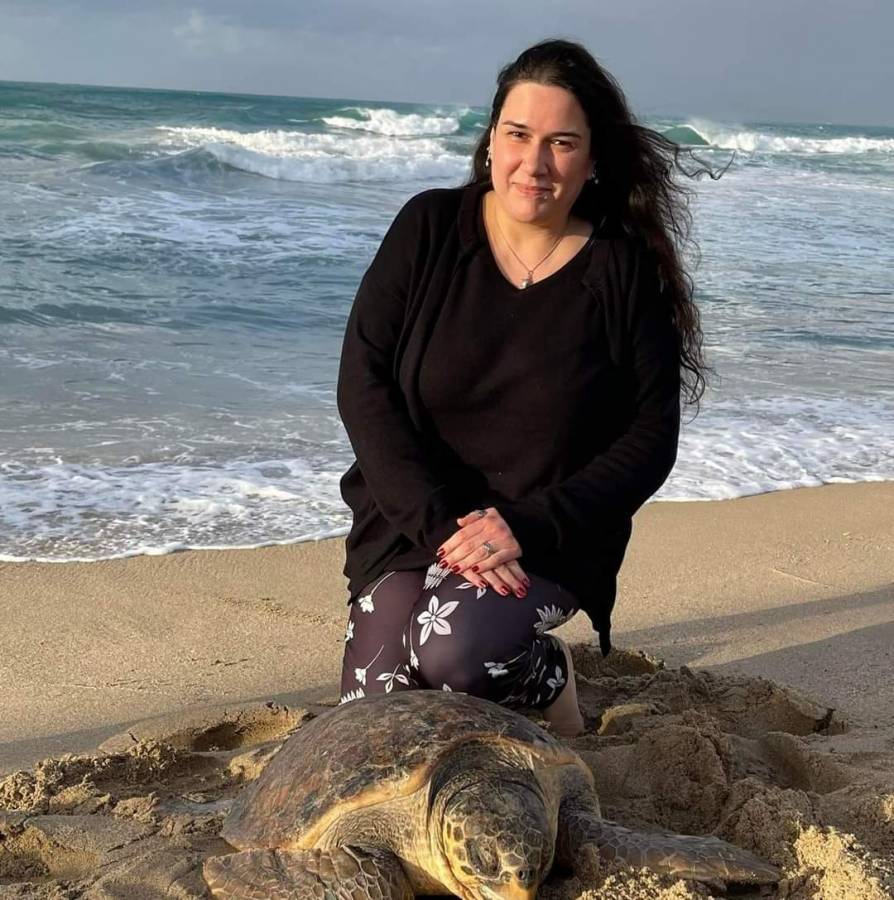
Why wild animals?
This passion that the thirty-something young woman has when it comes to caring for her animal friends, was not enough for her. Rather, she worked on empowering herself even more to become worthy of serving and caring for these innocent souls. She enrolled in many training programs, and made sure to keep reading and educating herself in this field, in addition to following up on efforts being made in neighboring countries. “I was selected by the United States Embassy to participate in a program concerning animal protection, and I have traveled and visited many places and gained experience, knowledge, and connections that I consider helpful to me to this day.”
In 2014, Mau (pronounced May), a graduate from the faculty of early childhood education, decided to expand her volunteer work in the field of saving and protecting wild animals, and so she founded a team of 20 volunteers that is now known as the “Alexandria Turtle and Wildlife Rescue Team”.
“I am trying, with the help of the team, to return the animals to their natural habitat, safeguard them from extinction, and give them another chance to increase their numbers, due to the risk of extinction that occurs from poaching, overfishing and animal abuse.” This is what pushes Mau to intensify her efforts to protect animals. She chose wild animals in particular, because they do not usually receive the needed attention from people who usually only care about domestic animals and pets, such as dogs, cats and horses.
Mau and her team provide services to rescue and care for wild animals. They receive free assistance from many doctors in Egypt in order to handle injured animals. The young lady is also in contact with doctors outside Egypt in order to help her rehabilitate and treat animals. “In Egypt, we do not have enough veterinary experience when it comes to caring for wild animals, so I contact animal organizations and hospitals abroad that specialize in treatment and rehabilitation, and follow up with them with the help of the doctors here.”
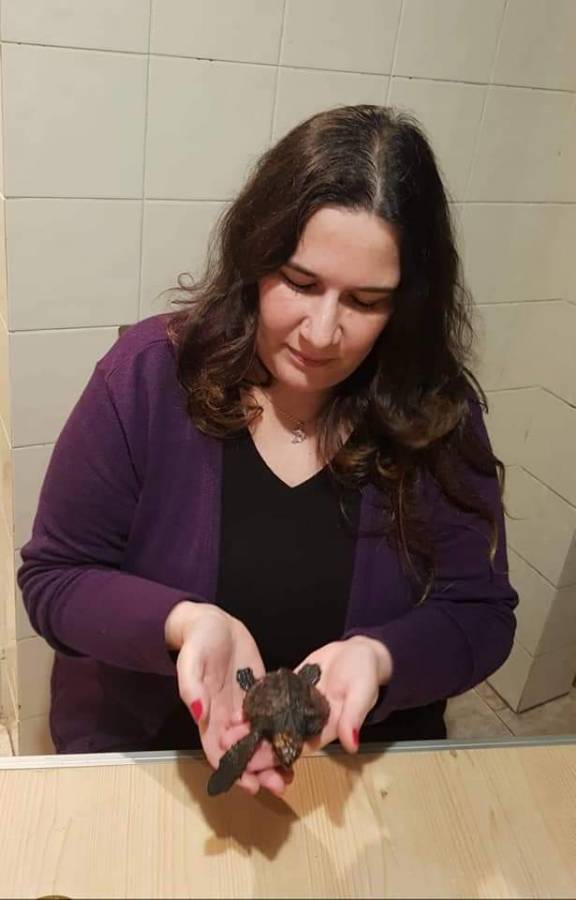
Mau and her team try their best to heal animals from the damage they are subjected to, especially from those posed by pollution, poaching, overfishing, and abuse in hunting, transporting and selling practices, and this is what prompted her to establish a rehabilitation center in her home in Alexandria. In it, she works on treating and rehabilitating injured animals before releasing them back in the wild. “I try to provide an environment similar to theirs with of course a suitable amount of space and temperature.”
Mau works mainly with her own team, and if she finds a person who has important information that can benefit the team and the residents when dealing with animals, whether in terms of rescue or rehabilitation, she would host them in awareness campaigns. She also turns to “falconers” — bird handlers and people who raise falcons, eagles, and various types of birds of prey — whenever her team needs to treat and rehabilitate birds of prey, because they have a lot of experience in this regard. But on the other hand, she does not accept their commercial practices when it comes to these birds, saying, “I am with the law, and I am with animals living in their natural habitat and not in captivity.”
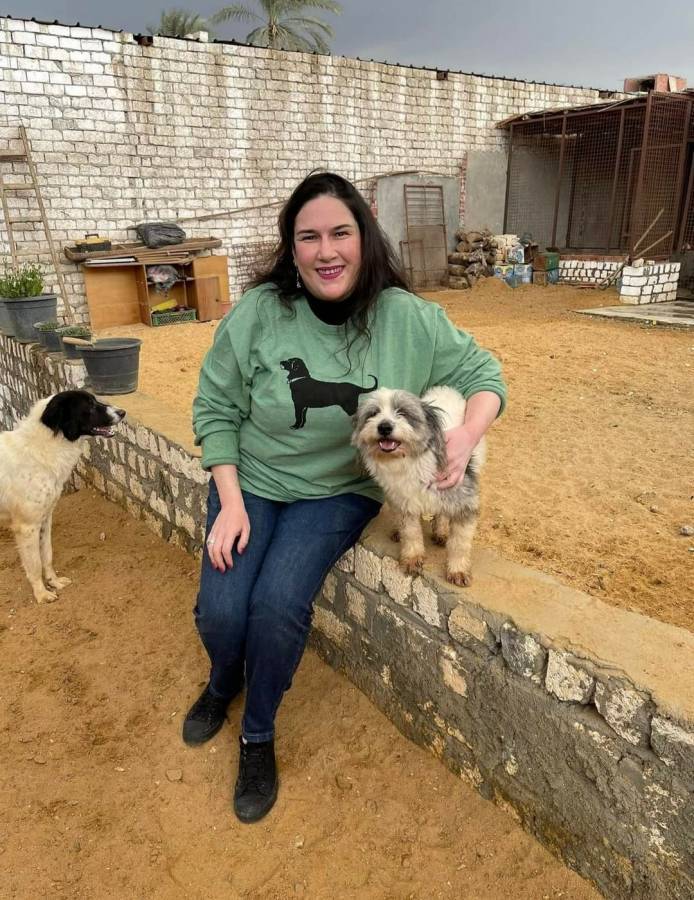
The turtle whisperer
Mau points out that there are many types of endangered wild animals in Egypt, whether they are birds of prey or turtles. Here, Mau explains about the different types of turtles present in the country today, and how they have changed over the years.
“The Egyptian tortoise is the kind that lives in the desert, and it is almost extinct here because of poaching, and since it’s mainly smuggled through Libya. As for sea turtles, at the beginning of our work, we were mainly finding and helping the species known as the ‘green turtle’. Currently, this species has decreased in number in comparison to a more common type that is called the ‘loggerhead sea turtle’, and we also find many turtles of the small size.”
Regardless of the species, what Mau cares about is safeguarding turtles from extinction, and from captivity, because many people subject turtles to slaughter, or put them in boxes for decoration. “It is of mercy for turtles to live in their environment,” as she puts it, adding that taking care of the Egyptian tortoise that lives in the desert in particular is an obsession of hers, because this tortoise is the second smallest in the world. It is not larger than the palm of a hand, and the numbers of these tortoises are gradually declining. Their presence is necessary for Egypt in particular, because they bear its name.
I'm trying to return the animals to their natural habitat, safeguard them from extinction, and give them another chance to increase their numbers, due to the extinction risk that occurs from poaching, overfishing and animal abuse
As for sea turtles, she says, “They are important because their increase reduces the number of jellyfish, and because it is the only creature that feeds on the sponges that live in the Red Sea, and its increasing presence covers the coral reefs and subsequently affects the country’s tourism.”
All the efforts that Mau puts in to save turtles was the secret behind the media calling her “the Turtle Whisperer”, indicating that she is good at talking to these animals. She was introduced with this title during one of the Global Leadership Youth Program meetings on ‘Combating Wildlife Trafficking’ organized by the San Diego Diplomacy Council. Her photos also clearly show her strong relationship with turtles.
Campaigns and reports
The activity of the animal rescue team expanded, so much so that it managed to attract the attention of the Environment Ministry, which intensified its efforts in caring for turtles. This comes “in addition to our role in raising awareness with the police, and cooperating with them, so that they care for turtles after we’ve shed light on the issue.”
In addition to turtles, the team has made significant efforts and contributions to save a great number of rare animals, including foxes, wolves, reptiles, owls, and other species.
Mau has carried out more than 250 awareness campaigns and volunteer workshops aimed at spreading awareness among people to protect and care for animals, especially those that are endangered. “The awareness-raising and workshops have had a great impact and instilled a spirit of cooperation between us and the residents in order to re-promote the culture of animal welfare. These initiatives had a strong impact, that even children have become more aware and interested. They now want to participate in events and rescue operations, as well as in adopting, caring for, and feeding street animals.”
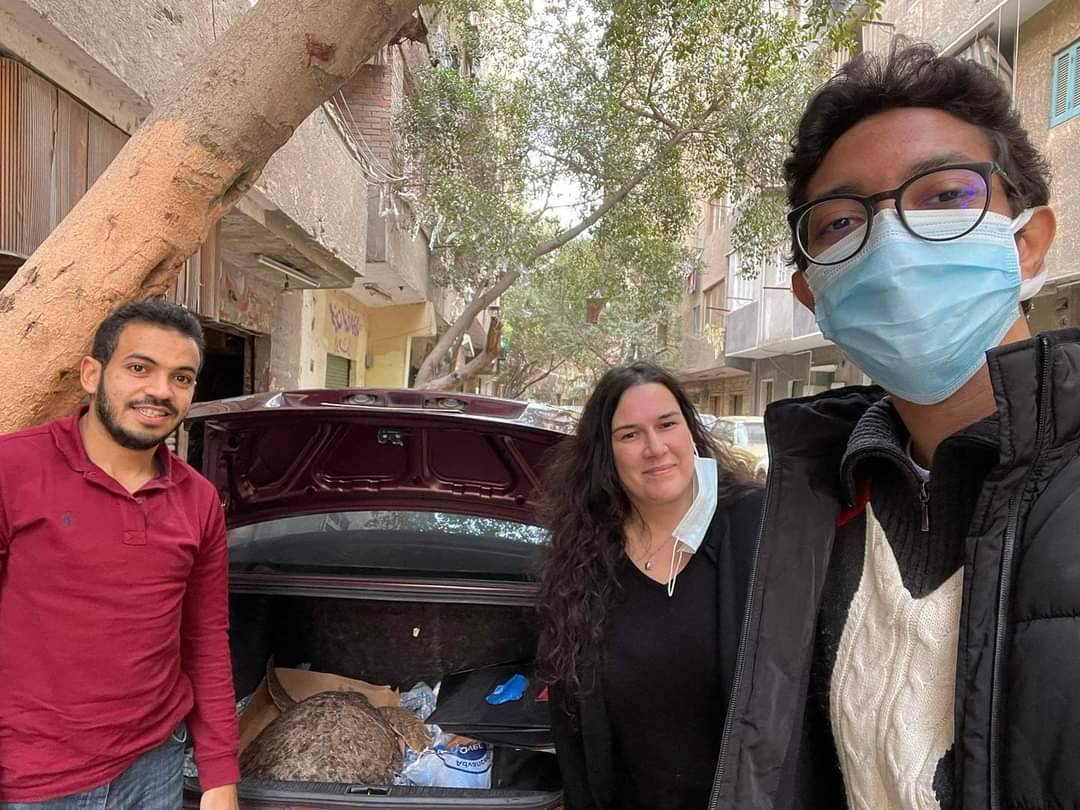
This influence has also reached social media sites. The team now receives many reports concerning animals in need of rescue, after it was able to help promote concepts that may have been absent from the Egyptian public, which include how wrong it is to trade in all birds or animals other than dogs, cats, and ornamental birds.
As a consequence, residents from different cities in Egypt are cooperating to report the injured animals, or those that are being put up for sale. The team then hurries to buy them or confiscate them, transport them to their headquarters in Alexandria, then treat, rehabilitate, and return them to their habitat. They are left in the zoo, released in natural reserves such as the Omayed Reserve for foxes, released into the air if they are birds of prey, or returned to the sea if they are sea turtles. Mau points out that “the people help us in terms of reporting. They help me stay connected with the areas of the animals that need rescuing, and we find many people praying for us when we rescue the animals. The moment the animal is released is a moment of farewell, as it’s possible we will not see these friends again.”
Taking care of the Egyptian tortoise that lives in the desert is her obsession because it’s the second smallest tortoise in the world. Its numbers are declining, and its presence is necessary for Egypt in particular, because it bears its name
Big dreams
In 2018, Mau was chosen as the World Animal Day Ambassador in Egypt, but this is not the success she’s aiming for. “I count every rescue as an achievement,” she says, noting that the number of her achievements are how many animals were rescued, the trust she has gained from residents who are quick to report any injured or endangered animal, as well as her success in creating a good reputation for herself and the team. “We became known both locally and internationally.”
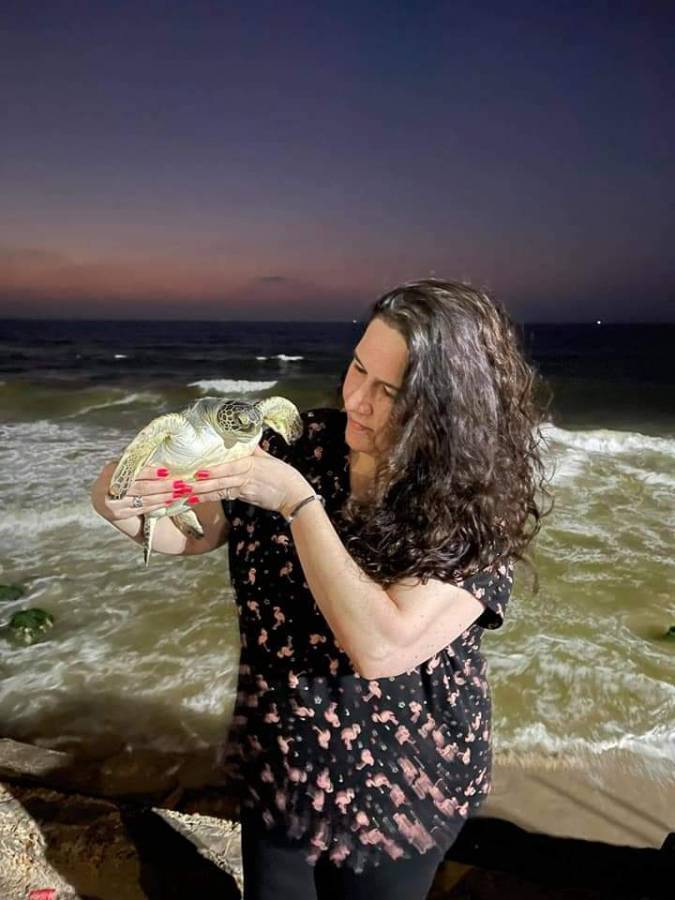
Mau has many dreams, all of which are connected to humane concepts that every individual must believe in. “It is a dream, not for me, for animals, I wish there will be laws that carry heavy penalties to punish people who trade in animals illegally, and punish those who torture animals.”
Mau also aspires that there be protocols in place between countries that would allow animals of all kinds to return to their original homeland, if they were found abroad, in addition to teaching animal welfare in the Egyptian curricula.
Raseef22 is a not for profit entity. Our focus is on quality journalism. Every contribution to the NasRaseef membership goes directly towards journalism production. We stand independent, not accepting corporate sponsorships, sponsored content or political funding.
Support our mission to keep Raseef22 available to all readers by clicking here!
Interested in writing with us? Check our pitch process here!
